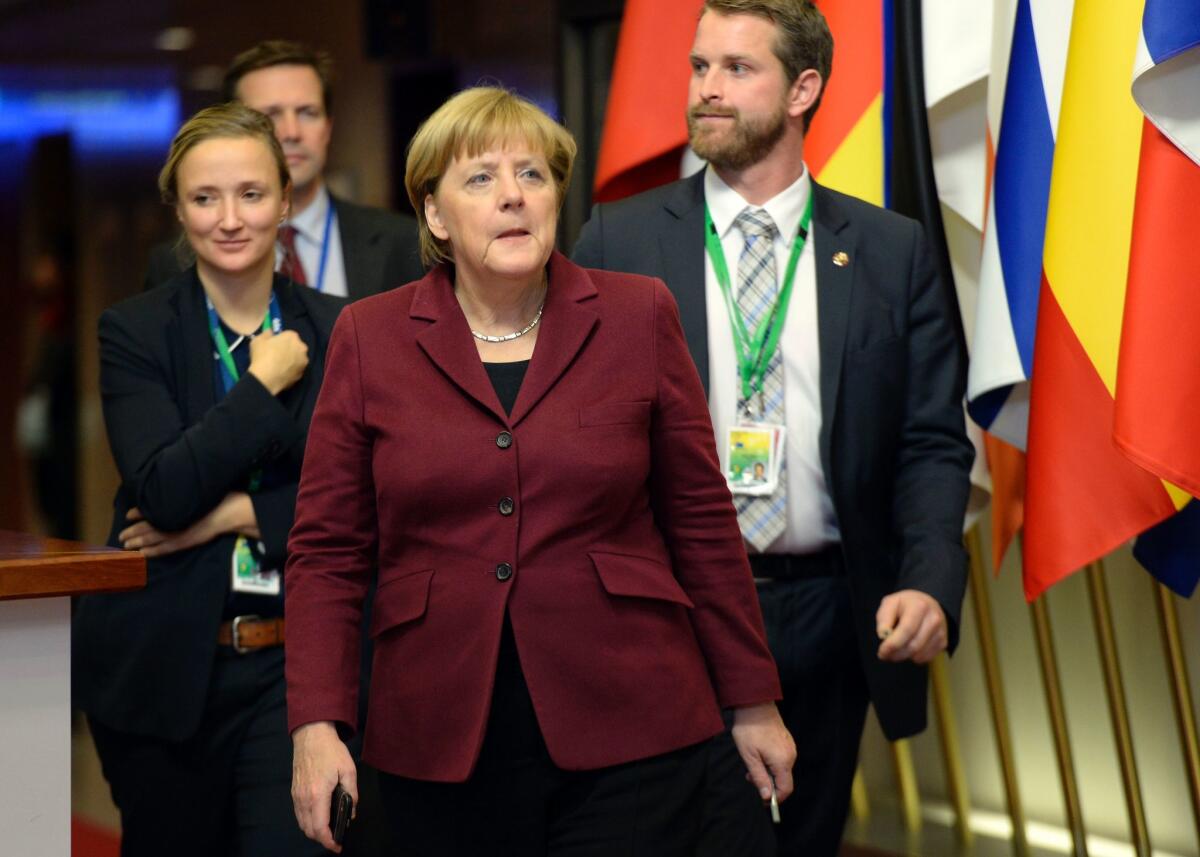Fears of Russia and Trump drive EU leaders to boost defense budgets

German Chancellor Angela Merkel, center, departs the European Union summit in Brussels.
- Share via
Reporting from Brussels — Meeting for the first time since the U.S. presidential election, European Union members agreed Thursday to increase their spending on defense.
President-elect Donald Trump’s friendly overtures to an expansionist Russia and his statements casting doubt on his commitment to the NATO alliance have sent shudders through Europe.
The agreement to boost national defense budgets was widely seen as a response to the election and fears that the U.S. may become a less dependable ally.
“Europeans must take greater responsibility for their security,” EU leaders wrote in a briefing document after the summit.
During his campaign, Trump said the U.S. was carrying too much of the burden of maintaining the North Atlantic Treaty Organization. The treaty recommends that each member’s defense spending be at least 2% of its gross domestic product, a threshold met only by the United States, Greece, Britain, Estonia and Poland.
Under the agreement reached Thursday, all 28 EU members — even the six that are not part of NATO — promised to meet that standard. If they follow through, defense spending in Europe will increase dramatically.
“We need to tighten up our defense structures in NATO and with NATO,” said German Chancellor Angela Merkel.
Concern about defense centered on Russian aggression.
At the summit, Merkel and French President Francois Hollande pushed for the EU to impose new economic sanctions against Russia, which along with Syrian government forces carried out the devastating bombing of Aleppo.
“We have a situation here where the [Syrian] regime through the use of brutal violence and with the help of Russia has gained the upper hand,” Merkel told reporters.
But she failed to convince other leaders, even after an emotional meeting with the mayor of east Aleppo, who pleaded with the politicians to help Syrian civilians.
“I am not calling on countries to go to war,” the mayor, Brita Hagi Hasan, told reporters before the meeting. “But more than words are needed to save civilians.”
Donald Tusk, the president of the European Council, which represents the leaders of EU member countries, said the U.S. presidential election threw uncertainty into the decision over sanctions because of Trump’s warmer attitude toward Russia.
“We have to wait for the formal declarations of the new president,” Tusk said.
Separately, the leaders agreed to a six-month extension of sanctions that were already in place against Russia for its military actions in Ukraine. The EU first imposed those sanctions after a Malaysia Airlines plane was shot down over a rebel-held part of Ukraine in 2014.
The summit came at the end of a year that rattled mainstay politicians across Europe as the continent’s struggle with immigration has increased support for far-right populist parties and British voters approved the so-called Brexit referendum to leave the EU.
British Prime Minister Theresa May attended the summit but was excluded from a dinner where the leaders of the remaining 27 EU countries discussed how they will coordinate Britain’s exit from the bloc.
Stupp is a special correspondent.
ALSO
Chinese who first glimpsed American culture through Alan Thicke mourn his death
Syria’s Assad hails ‘the liberation of Aleppo’ as evacuations begin from devastated city
A top Danish chef plans to open a $600-per-diner pop-up in Mexico, and it’s already fully booked
More to Read
Sign up for Essential California
The most important California stories and recommendations in your inbox every morning.
You may occasionally receive promotional content from the Los Angeles Times.










